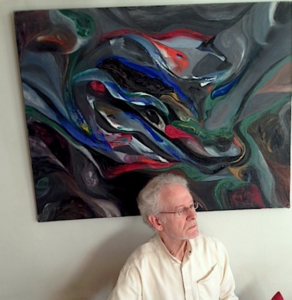[ from the section CHINESE NOTEBOOK]
Near the window a sparrow is startled
By its reflection or this man?
The hand behind slowly moving the pen
Under the face met in the evening
The echo of a memory
Of other faces never seen again
So it is with love after the first day
Enjoy the sun dying
Behind the modesty of a cloud
Extenuating appeals in the early hours
Petty beings seeking
The ones the night has distanced
A huge and fragile moon sits
On a golden line
It has already begun to tarnish
Its pale disk almost vanishing
Like soap residue
in the water
***
In a dream the meeting with Xin Oiji
Not even that old
We don’t understand our languages
If the finger of the wise man points to the moon
It does so to keep from sight
The hands dissolved in the shadow
Does the spirit survive in the beloved memory
Of some (at least) one
Or only a gesture a smell these words?
If the wind shakes man-made towers
Like twigs dragged by the currents
What good is it to embrace beauty?
He says: do not despair for what stands
There as a threat
But rather for what we are
Those who come behind march on shadows
Lowered against the ground
In vain battle
[from the section INHABITING THE INVISIBLE]
The urn containing but a few ashes
Fragrant with your language
Is broken. The rain drenches
The future bones of the glorious body
Glue the shards back together – translate…
All is silence
Under words
That are foreign
***
Walking along an immaterial line
Many disoriented small migrations
[from the section HANDKERCHIEFS. SHAWLS]
Like a horse
Poetry is like an old circus horse
Snorting as he walks past among spectators
Or in a hallway amid sad rooms
Where it distracts the patients while their
Present blurs away at the end of the track
(they call it Peyo)
Threshold
Dust gathers at the margins
So do tiny scales, hair
Whether blond or black falling on account of the stroke
Of a loving child, a hurried
Lover, as well as fly fragments
Journey
You are left with the useless label
Of minimal luggage
You save it as a souvenir
That one could call sentimental
Of a place that it would seem was your city

Jean-Charles Vegliante lives in Paris. Professor emeritus at Sorbonne Nouvelle (Paris3), he is the author of the seminal text D’écrire la traduction (PSN, 1996-2000). He has translated into French The Divine Comedy (Gallimard, 2012-14), Giacomo Leopardi’s Canzoni (in collaboration, 2014), G. Pascoli, L’impensé la poésie (selection with essay Mimésis, 2018). Jean-Charles Vegliante has also translated into French important Italian authors classics such as Gabriele D’Annunzio, Eugenio Montale, and post WW2 poets such as Franco Fortini, Giovanni Raboni, Amelia Rosselli, Vittorio Sereni, Mario Benedetti, Eugenio De Signoribus. His translations from French into Italian include works by F. Ponge, Ph. Denis, F. Muir and others. His Italian poetry anthology, which includes some dialect poems, is being published in instalments in the website “Recours au Poème”. The following are his own poetry collections: Rien commun (Belin 2000), Nel lutto della luce / Le deuil de lumière (trans. G. Raboni, Einaudi, 2004), Itinerario nord (2008), Urbanités (2015), Pensiero del niente (trad. F. Piemontese, Stampa 2009, 2016), Où nul ne veut se tenir (Bruxelles, La Lettre volée, 2017, distinto dall’Académie française), Trois cahiers avec une chanson (Atelier du grand tétras, 2020).
Photo: J-C Vegliante in front of one of his paintings.





















































